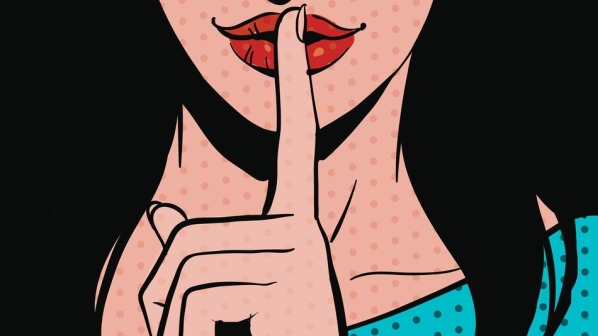
Today I am going to tell you something. Most people in marginalized populations know it to be true, but I think it needs to be made clear for everyone. So I’m going to clue you in. Only this secret is something you should share with everyone: your bank teller, your estranged friend in New Zealand, the friend you eat pesto pasta with every Tuesday afternoon, even your chinchilla Fred.
The secret is: the hostility towards me, and the people like me, is not going to get anyone anyplace. I know the rationale. I have a disability, and the disability I have is labeled “The Swearing Disorder.” The jokes about it have been virtually left alone by the social justice movement. Online and in pop culture, people are free to say the most offensive, uneducated statements about it. The influence of TV and social media paves the way for these thoughts to come into real-world situations, where they are turned to words and actions. We all have to feel like we are better than someone, right? And I’m right here.
In the past years, months, and weeks, people have mocked my tics, told me my ambitions were laughable, tried to derail my career path, and just been overtly rude. My very being here is a joke or an offense to them. But the thing is–these people are not going to get ahead by showing their prejudice towards me. As the world moves forward, this way of thinking is going to fall by the wayside. Soon, these thoughts and actions will be unacceptable–even in the case of Tourettes. We’ve seen it with movements like “Spread the Word to End the Word,” which lead to the passing of Rosa’s Law in 2010. Rosa’s Law was unanimously passed in both the US House and Senate, by the way. The legislation removes the words “mental retardation” and “mentally retarded” from federal laws. Additionally, the movement greatly removed the “r” word from the American vocabulary. A google trend search on the term “mentally retarded” results in the following graph, where 100 means peak interest, 50 means 50% as popular as the peak, and 0 means less than 1% as popular as the peak:

Of course, this movement has not ended discrimination towards individuals with different abilities, but I think it is certainly a start. The way we speak affects the way we think and create culture (see WSJ, Mental Floss, etc. for more details). The movement also made popular the idea that it is unacceptable to use the “r” word as an insult or a descriptor, which is a huge victory for respect and compassion.
The path to end the hostility towards people with Tourette’s will look different, for a couple of reasons. For starters, there is no one word to rally against which can be the backbone of the movement. We are pushing against a host of insults and untrue claims; it is hard to choose what to focus in on. Secondly, Tourette Syndrome is, for lack of a better term, distilled down compared to fight to end the “r” word. It is a specific disorder, affecting only 1 out of 360 children in the US (CDC). And as those kids get older, the number gets fewer, as many “outgrow” the disorder. For us, the path towards kindness and understanding is likely going to include lots of re-education and re-defining the social norm. Our journey will be different and long, but that does not mean we should not have it.
Personally, I hurt thinking about when I was told I would never make it at a big university, that I could never live in a town far away, and that I was not beautiful. I resent being put on drugs that stole away two years of my life, and getting unsatisfactory care because doctors choose to experiment with my meds. My heart aches at the memory of being mocked for years by someone I trusted.
I am tired of being told that I am less than a full human because I tic.
Welcome to Tic Tock, where whether it is just me, or a hundred people, there is a movement. A movement to spread the message that no one needs to be superior to be happy. A movement to love each other for who we are, not for what our bodies do. And here, that is not a secret.
–KMJ


 Today's topic is one of the most frustrating things I experience on a nearly daily basis, and something I am sure that I, myself, do to others who I unconsciously deem "lesser." Let's have an honest conversation.
Today's topic is one of the most frustrating things I experience on a nearly daily basis, and something I am sure that I, myself, do to others who I unconsciously deem "lesser." Let's have an honest conversation.